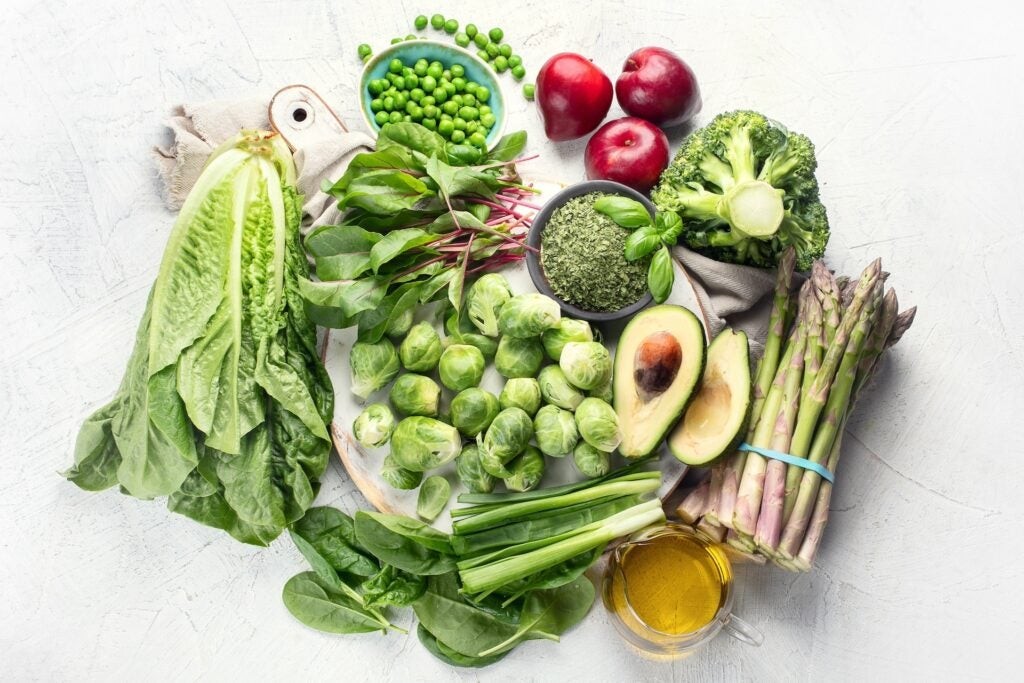Vitamin K, a fat-soluble vitamin, is crucial for several bodily functions, primarily blood clotting and bone health. It exists in two main forms: phylloquinone, abundant in green leafy vegetables, and menaquinones, found in certain animal and fermented foods, and also produced by gut bacteria. This article delves into the essential role of vitamin K in blood clotting, exploring food sources, recommended intakes, and potential health implications.
The Importance of Vitamin K for Blood Clotting
Vitamin K is vital for producing various proteins necessary for blood clotting, a process that stops bleeding and allows wounds to heal. Prothrombin, a vitamin K-dependent protein, plays a direct role in blood clot formation. Without sufficient vitamin K, the body cannot produce these proteins effectively, leading to prolonged bleeding.
 Assortment of green leafy vegetables including kale, spinach, and collard greens, showcasing foods rich in Vitamin K
Assortment of green leafy vegetables including kale, spinach, and collard greens, showcasing foods rich in Vitamin K
Vitamin K and Anticoagulants
Individuals prescribed anticoagulants, or blood thinners, need to be particularly mindful of their vitamin K intake. These medications prevent blood clots from forming, and vitamin K can potentially counteract their effects due to its blood-clotting action. Monitoring prothrombin time (PT), which measures how long it takes for blood to clot, is crucial for people on anticoagulants like warfarin (Coumadin). Consistent vitamin K consumption is generally recommended, as significant fluctuations can interfere with the medication’s effectiveness. While food labels don’t typically list vitamin K, healthcare providers often offer guidance on vitamin K-rich foods for those on anticoagulant therapy.
Recommended Daily Intake of Vitamin K
The adequate intake (AI) for vitamin K in adults aged 19 and older is 120 mcg daily for men and 90 mcg for women, including those who are pregnant or lactating. This AI is an estimate based on available evidence to ensure nutritional adequacy.
Food Sources of Vitamin K
To maintain adequate vitamin K levels, incorporate these foods into your diet:
- Green Leafy Vegetables: Kale, spinach, collard greens, turnip greens, and lettuce are excellent sources of phylloquinone.
- Other Vegetables: Broccoli, Brussels sprouts, and cabbage also contribute to vitamin K intake.
- Animal Products: Certain animal products, especially organ meats, contain menaquinones.
- Fermented Foods: Natto, a fermented soybean product, is a particularly rich source of menaquinones.
The Role of Vitamin K in Bone Health and Heart Health
Beyond blood clotting, Vitamin K is also essential for maintaining bone health by supporting the production of bone proteins, including osteocalcin. Some studies suggest that higher vitamin K intakes are associated with a lower risk of hip fractures and improved bone density. Additionally, Vitamin K aids in the production of matrix Gla proteins (MGP), which help prevent the calcification of heart arteries, potentially reducing the risk of heart disease.
Signs of Vitamin K Deficiency
Although rare in adults, vitamin K deficiency can occur due to certain medications, such as antibiotics, or conditions causing malabsorption. Newborn infants are also at risk due to limited placental transfer of vitamin K and low levels in breast milk. Common signs of vitamin K deficiency include:
- Prolonged blood clotting time
- Excessive bleeding
- Hemorrhaging
- Osteopenia or osteoporosis
Important Considerations
- Antibiotics can disrupt gut bacteria that produce vitamin K, potentially lowering vitamin K levels, especially with long-term use.
- Consuming vitamin K-rich foods with some fat can improve absorption, as vitamin K is fat-soluble.
Ensuring adequate vitamin K intake through a balanced diet is essential for healthy blood clotting, bone health, and overall well-being. If you are taking anticoagulant medication, consult with your healthcare provider to determine the appropriate level of vitamin K intake for your individual needs.
